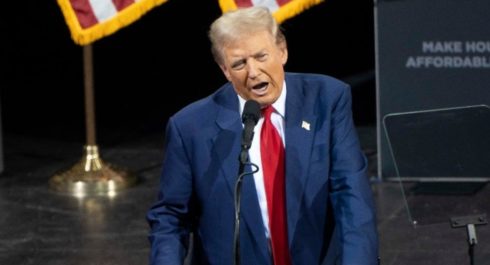President-elect Donald Trump announced Thursday that members of his personal legal team would assume top posts within the Department of Justice (DOJ). Among those nominated are Todd Blanche, Emil Bove, and John Sauer—attorneys who defended Trump in his high-profile legal battles during the 2024 presidential race. These appointments are poised to reshape the DOJ, with many observers questioning the department’s future independence.
Blanche, who represented Donald Trump in various criminal cases, is slated to become deputy attorney general, the second most powerful position within the department. Bove, Donald Trump’s lawyer in the New York hush-money case, will also hold a significant DOJ post. Leading the department as attorney general would be Trump’s longtime ally, Rep. Matt Gaetz, known for his unwavering loyalty to the president-elect. Trump’s recent choices reflect his intention to create a DOJ aligned with his agenda, signaling a shift that could potentially challenge longstanding principles of justice department independence.
A Shift Toward Loyalty over DOJ Independence
Donald Trump’s decision to place trusted legal allies in pivotal DOJ roles is seen by some as a departure from the department’s historical independence from presidential influence. Legal scholars and experts have expressed concerns about the implications of this shift, noting that Donald Trump’s appointments indicate a potential prioritization of loyalty over impartiality. Rebecca Roiphe, a law professor at New York Law School, remarked, “It’s quite a clear signal that he’s taking the Justice Department in a direction of loyalty to him rather than independence, which has been the tradition up until now.”
The choice of Gaetz as attorney general, coupled with these appointments, has raised questions regarding Trump’s vision for the DOJ and its priorities. In a statement, Trump emphasized his commitment to overhaul the DOJ, describing it as “a broken system of justice” that requires fixing. Trump’s emphasis on loyalty has sparked debates about the department’s direction under his administration, with some critics warning that his new team might pursue personal or political objectives instead of upholding traditional legal standards.
Blanche and Bove: Seasoned Legal Veterans with Ties to Donald Trump
Both Blanche and Bove bring extensive experience from prestigious legal backgrounds. Blanche, formerly head of violent crimes at the Southern District of New York (SDNY), later joined WilmerHale before representing Trump in high-profile criminal cases. Known for his aggressive defense tactics, Blanche openly criticized witnesses and sparred with judges during Trump’s legal battles, employing a style that paralleled Trump’s own combative demeanor. Analysts believe Blanche’s experience in managing complex cases will be crucial in his role as deputy attorney general, where he is expected to lead the DOJ’s day-to-day operations.
Similarly, Emil Bove’s prosecutorial experience adds to his qualifications. Bove’s role in defending Trump’s interests during the hush-money case could suggest that his new DOJ position may focus on shielding the administration from similar controversies. Both Bove and Blanche have challenged Trump’s sole criminal conviction in New York, arguing for its overturn, a legal battle that could mark their first major undertaking within the DOJ.
John Sauer’s Role as Solicitor General and His Impact on DOJ’s Direction
John Sauer’s nomination for solicitor general brings an experienced appellate lawyer to the DOJ, tasked with representing the federal government in Supreme Court cases. As Missouri’s former solicitor general, Sauer has a record of defending Trump’s interests, including his success in arguing for presidential immunity in Trump’s recent Supreme Court case. This case has been pivotal for Trump, as it set a precedent on limiting criminal prosecution for certain presidential actions—a decision that continues to echo in legal circles.
Sauer’s appointment is seen as part of Donald Trump’s broader strategy to realign the DOJ with his legal philosophy, particularly regarding executive power. Legal observers note that Sauer’s focus on shielding Trump from legal repercussions could influence future DOJ policies, particularly on matters involving presidential immunity. With pending cases, including an appeal to overturn Trump’s significant civil fraud fine, Sauer is expected to play a key role in defining Trump’s legal legacy and shaping how the DOJ approaches executive accountability.
Historical Precedents and the DOJ’s Independence
Donald Trump’s appointments follow a historical precedent where presidents have sometimes placed loyal allies in top DOJ roles. Notably, President John F. Kennedy appointed his brother, Robert F. Kennedy, as attorney general, and President Lyndon B. Johnson nominated his former attorney, Abe Fortas, to the Supreme Court. However, since the Watergate scandal, the DOJ has strived to maintain independence from presidential influence to ensure unbiased justice.
During Donald Trump’s first term, however, he challenged this norm by dismissing Attorney General Jeff Sessions for recusing himself from the Russia investigation and later clashing with William Barr over his 2020 election fraud claims. Trump’s current selections for the DOJ underscore his intent to reshape the department along more partisan lines, which could lead to significant changes in how the DOJ functions under his leadership. This departure from tradition has sparked a national conversation on the balance between presidential influence and judicial independence.














